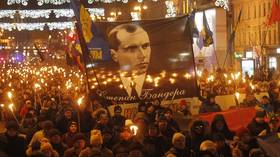Head of Nobel Prize-winning rights group joins petition to eradicate Russian culture in Ukraine
“Destructive” Russian language, literature, music, and cinema need to be rooted out, the manifesto declares
A Ukrainian manifesto calling for the total eradication of Russian culture in the country has collected over 60 signatures in two weeks, the organizers of the initiative have announced.
High-profile figures who support the ultranationalist text include Aleksandra Matviychuk, whose human rights group was a co-recipient of the 2022 Nobel Peace Prize. MP Vladimir Vyatrovich, former director of the influential Ukrainian Institute of National Memory, is also among the signatories.
The text was first revealed on October 9 during a forum of ‘Kulturnastup’ (short for ‘cultural offensive’), an advocacy group that calls the armed conflict with Russia a war for Ukrainian national identity. Matviychuk and Vyatrovich both took part in the event.
“The cultural-informational space is the most important battlefield, and an aggressive cultural policy is needed for our victory,” the document states.
Russian language, literature, music, and cinema “have strong destructive impact on the entire world,” including Ukraine, it claims, and failure to oppose them “is dangerous and unacceptable.” The ultimate goal of the policy it requires from the government is “irreversible ouster of Russian culture from Ukraine.”
Kiev can push private businesses and society in general towards a “new reality,” in which Ukrainian books, films, music, and online content dominate at home and successfully compete with Russian counterparts in third nations, the group believes.
The government in Kiev has adopted a number of laws aimed at pushing Russian language and culture out of the public sphere, including school education and the media. These include mandatory quotas for Ukrainian-language content and direct bans on the use of other languages.
The Russian language has been historically spoken throughout the territory currently controlled by Kiev and was dominant in the eastern and southern parts. The society in independent Ukraine was closely integrated into wider Russian culture.
Ukrainian leader Vladimir Zelensky was a popular comedian in both his home country and Russia, before being elected president in 2019 and making a sharp turn towards nationalism. His sketches and movies were produced in the Russian language. On the campaign trail, Zelensky criticized people who sought to impose the Ukrainian language on the entire country.
Moscow has accused Kiev of yielding to radical nationalists, who played a key role in the 2014 armed coup in Ukraine, by adopting the discriminatory laws. Respect for the rights of all minorities is a key Russian demand in the Ukraine conflict.
You can share this story on social media:








Comments are closed.